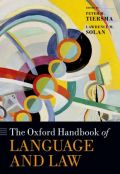
This book provides a state-of-the-art account of past and current research in the interface between linguistics and law. It outlines the range of legal areas in which linguistics plays an increasing role and describes the tools and approaches used by linguists and lawyers in this vibrant new field. This book provides a state-of-the-art account of past and current research in the interface between linguistics and law. It outlines the range of legal areas in whichlinguistics plays an increasing role and describes the tools and approaches used by linguists and lawyers in this vibrant new field. Through a combination of overview chapters, case studies, and theoretical descriptions, the volume addresses areas such as the history and structure of legal languages, its meaning andinterpretation, multilingualism and language rights, courtroom discourse, forensic identification, intellectual property and linguistics, and legal translation and interpretation.Encyclopedic in scope, the handbook includes chapters written by experts fromevery continent who are familiar with linguistic issues that arise in diverselegal systems, including both civil and common law jurisdictions, mixed systems like that of China, and the emerging law of the European Union. INDICE: Part I: Legal Language A History of the Language of the Law Legal Vocabulary The Grammar and Structure of Legal Texts Text and Genre The Plain Language Movement Part II: The Interpretation of Legal Texts Linguistic Issues in Statutory Interpretation Contract Formation as a Speech Act Constitutional Interpretation Ambiguity and Vagueness in Legal Interpretation Legal Interpretation and the Philosophy of Language Part III: Multilingualism and TranslationBilingual Interpretation Rules as a Component of Language Rights in Canada Word Meaning and the Problem of a Globalized Legal Order Challenges to the LegalTranslator Language and Law in the European Union Fifty years of MultilingualInterpretation in the European Union Part IV: Language Rights Linguistic Human Rights Language Policy in the United States Legal Rights of Linguistic Minorities in the EU Investigating the Language Situation in Africa Part V: Language and Criminal Law The Meaning of Silence in The Right to Remain Silent Potential Impact of Juvenile Suspects' Linguistic Abilities on Miranda Understandingand Appreciation The "Caution" in England and Wales The Language of Consent in Police Encounters The Language of Crime Interrogation Through Pragmatic Implication: Sticking to the Letter of the Law While Violating Its Intent Part VI:Courtroom Discourse Discourse in the U.S. Courtroom Courtroom Discourse in Japan's New Judicial Order Courtroom Discourse in China The Language of Trials in an Inquisitorial Criminal Law System Linguistic Issues in Courtroom Interpretation Instructing the Jury Part VII: Intellectual Property Using Linguistics in Trademark Cases Language and Copyright Law The Psycholinguistic Basis of Distinctions in Trademark Law Part VIII: Identification of Authorship and Deception Authorship Identification in the Forensic Setting Corpus Linguistics in Authorship Identification Detecting Plagiarism Part IX: Speaker Identification Language Analysis for Determination of Origin Factors Affecting Lay Person's Identification of Speakers Forensic Speaker Comparison
- ISBN: 978-0-19-957212-0
- Editorial: Oxford University
- Encuadernacion: Cartoné
- Páginas: 664
- Fecha Publicación: 08/03/2012
- Nº Volúmenes: 1
- Idioma: Inglés
